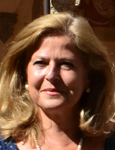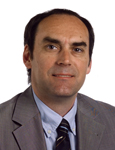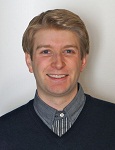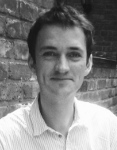 Take one of the most beautiful places in the world: the landscape, the villas and the monasteries of Fiesole, near one of the world’s most fascinating cities. Add one of the richest and best organised libraries of Europe, with advanced technology and experienced professionals, a place where you can breathe everlasting culture and knowledge. Add the vibrancy and cultural diversity of a genuinely international community, passionate for science and culture, always keen to discuss and challenge any preconceived thoughts. Add the effectiveness, dedication and availability of the staff, who makes it easy to feel part of the community upon your arrival. Not to mention the excellent services and the unsurpassed quality of Tuscan food. Last but not least, add the most motivating "mission" for someone like me who works in the European institutions to promote research and knowledge for a better Europe. All these, and many others, are the ingredients that have made my fellowship at the Robert Schuman Center a highly stimulating and beautiful time of my professional life. For sure, there are many qualified universities in the world where I could have proficiently developed my research and my reflections on EU and global economic governance. However, nowhere I could have benefitted from such a combination of intellectual inspiration, beauty, and quality of life as I found here.
Take one of the most beautiful places in the world: the landscape, the villas and the monasteries of Fiesole, near one of the world’s most fascinating cities. Add one of the richest and best organised libraries of Europe, with advanced technology and experienced professionals, a place where you can breathe everlasting culture and knowledge. Add the vibrancy and cultural diversity of a genuinely international community, passionate for science and culture, always keen to discuss and challenge any preconceived thoughts. Add the effectiveness, dedication and availability of the staff, who makes it easy to feel part of the community upon your arrival. Not to mention the excellent services and the unsurpassed quality of Tuscan food. Last but not least, add the most motivating "mission" for someone like me who works in the European institutions to promote research and knowledge for a better Europe. All these, and many others, are the ingredients that have made my fellowship at the Robert Schuman Center a highly stimulating and beautiful time of my professional life. For sure, there are many qualified universities in the world where I could have proficiently developed my research and my reflections on EU and global economic governance. However, nowhere I could have benefitted from such a combination of intellectual inspiration, beauty, and quality of life as I found here.
Antonia Carparelli, EU Fellow 2013-2014 (Economic Advisor, European Commission Representation in Italy)
 I have spent six months as an EU Fellow from the European Parliament at the European University Institute’s Robert Schuman Centre, which is located in a beautiful surrounding in the middle of the Tuscan hills. My work as an independent researcher far away from the Brussels stress and rush gave me much intellectual pleasure and satisfaction to carry out research on parliamentary diplomacy and oversight with focus on the EP’s post-Lisbon role in EU foreign policy. I simply enjoyed it here very much: in my office, which used to be the cell of a former Dominican monk in a still functioning 14 th century monastery, in the Library, which has outstanding resources and information services and primarily in discussions/consultations over lunch or macchiato, in working groups and seminars, with university professors and research fellows. Everybody was extremely helpful and supportive and I have not only gained an insight into university life but could also greatly deepen the knowledge and expertise on my subject. This has been a unique experience and I feel very lucky having had the opportunity to stay at this prestigious institute for a half a year.
I have spent six months as an EU Fellow from the European Parliament at the European University Institute’s Robert Schuman Centre, which is located in a beautiful surrounding in the middle of the Tuscan hills. My work as an independent researcher far away from the Brussels stress and rush gave me much intellectual pleasure and satisfaction to carry out research on parliamentary diplomacy and oversight with focus on the EP’s post-Lisbon role in EU foreign policy. I simply enjoyed it here very much: in my office, which used to be the cell of a former Dominican monk in a still functioning 14 th century monastery, in the Library, which has outstanding resources and information services and primarily in discussions/consultations over lunch or macchiato, in working groups and seminars, with university professors and research fellows. Everybody was extremely helpful and supportive and I have not only gained an insight into university life but could also greatly deepen the knowledge and expertise on my subject. This has been a unique experience and I feel very lucky having had the opportunity to stay at this prestigious institute for a half a year.
Péter Bajtay, EU Fellow 2013-2014 (European Parliament)
 I had the opportunity to be a Jean Monnet fellow in 2013-2014 and would highly recommend the experience. It is rare in academia to be given the opportunity to pursue your research interests in an environment like the Robert Schuman Centre for Advanced Studies. At the Schuman Centre, I was surrounded by top class faculty and peers, without having to worry about the teaching and administrative commitments usually associated with our profession. This allowed me to fully dedicate myself to research and led to a number of publications in leading academic journal in my field. I furthermore had time and space to develop a number of research ideas for which I am now in the process of applying for funding. Again, the freedom provided by the Jean Monnet fellowship to elaborate these ideas from initial thoughts to fully grown funding applications was key in getting to the point where I am now submitting them to funding agencies. Finally, when the time came to move on (as inevitably it did), having the association with the Schuman Centre and the networks I built there certainly helped in landing the next academic post. All things considered, the Jean Monnet programme is a great opportunity to develop as a scholar and provides an excellent stepping stone to future academic endeavours.
I had the opportunity to be a Jean Monnet fellow in 2013-2014 and would highly recommend the experience. It is rare in academia to be given the opportunity to pursue your research interests in an environment like the Robert Schuman Centre for Advanced Studies. At the Schuman Centre, I was surrounded by top class faculty and peers, without having to worry about the teaching and administrative commitments usually associated with our profession. This allowed me to fully dedicate myself to research and led to a number of publications in leading academic journal in my field. I furthermore had time and space to develop a number of research ideas for which I am now in the process of applying for funding. Again, the freedom provided by the Jean Monnet fellowship to elaborate these ideas from initial thoughts to fully grown funding applications was key in getting to the point where I am now submitting them to funding agencies. Finally, when the time came to move on (as inevitably it did), having the association with the Schuman Centre and the networks I built there certainly helped in landing the next academic post. All things considered, the Jean Monnet programme is a great opportunity to develop as a scholar and provides an excellent stepping stone to future academic endeavours.
James P Cross, Jean Monnet Fellow 2013-2014 (Lecturer in European Public Policy, UCD School of Politics and International Relations)
 As a Jean Monnet Fellow at the Robert Schuman Centre for Advanced Studies I was able to develop my historical research on the modern Middle East in a stimulating inter-disciplinary environment. Collaboration with scholars working on policy issues allowed me to contribute historical insights about the past origins of contemporary problems, as part of an intellectual community that is engaged but never simply presentist.
As a Jean Monnet Fellow at the Robert Schuman Centre for Advanced Studies I was able to develop my historical research on the modern Middle East in a stimulating inter-disciplinary environment. Collaboration with scholars working on policy issues allowed me to contribute historical insights about the past origins of contemporary problems, as part of an intellectual community that is engaged but never simply presentist.
Simon Jackson, Jean Monnet Fellow 2013-2014 (Assistant Professor in History of the Middle East, University of Birmingham)
Page last updated on 11 January 2019